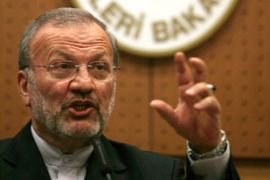Iran denies nuclear-bomb plan
Foreign minister accuses US of lying while calling his nation’s N-programme peaceful.

He restated Tehran’s view that the Iranian nuclear programme is peaceful and not geared towards the production of nuclear weapons, pointing out that possession of weaons of mass destruction violates Islamic teachings.
Improvement unlikely
Mottaki ruled out any improvement in his country’s ties with the US unless Washington alters its foreign policy following the election of a new president next month.
“Whatever candidate becomes the next president of the US, he will have no other option than to bring about new developments in American foreign policy,” he said.
He said that the next US president would have to try to “reach out to other countries around the world, including the countries in the Middle East”.
“If such developments happen in the White House, in words and in deeds”, Tehran would consider them, Mottaki said.
“So like everybody else we have to wait and see what the new US policies [will be after next month’s presidential election].”
US-Iran relations
Mottaki blamed Washington for the dismal state of bilateral relations.
“The behaviour shown by US officials in the past decades has not been encouraging, has not encouraged Iranian officials to work to improve relations,” he said.
“If serious changes come about with regard to such a behaviour, we will certainly study the possibility.”
Mottaki’s comments came as Ali Asghar Soltanieh, his country’s ambassador to the IAEA, insisted that Tehran would continue to enrich uranium while there was no legally binding international assurance of a nuclear-fuel supply.
“We are going to continue as long as there is no legally binding instrument for assurance of supply,” he said after attending a conference in the Belgian capital Brussels on Thursday.
Asked whether Iran would end its controversial uranium enrichment programme if such a guarantee were in place, Soltanieh said it would first have to be shown to be effective.
“It is not only the piece of paper, you have to practise … the plan,” he said.
“We had a contract with the US and they did not fulfil their obligations … Germany had a contract and they did not.”